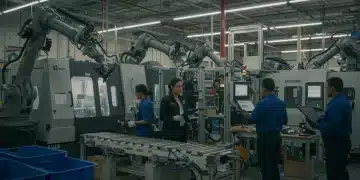The Future of Work in the US: Remote Work and Gig Economy Impact

The Future of Work in the US is being reshaped by the rise of remote work and the gig economy, offering flexibility but also presenting challenges in job security, benefits, and the need for updated labor laws to protect workers.
The landscape of work in the United States is undergoing a dramatic transformation. The confluence of technological advancements, shifting societal preferences, and recent global events has accelerated the adoption of remote work models and fueled the growth of the gig economy. Understanding the future of work in the US: analyzing the impact of remote work and the gig economy is crucial for policymakers, businesses, and workers alike.
Remote Work: A New Era of Flexibility
Remote work, once a niche arrangement, has become a mainstream option for many companies and employees. This shift provides numerous benefits, including increased flexibility, improved work-life balance, and reduced commuting time. However, it also presents challenges such as maintaining team cohesion and ensuring employee well-being.
Benefits of Remote Work
The advantages of remote work are compelling. For employees, it can mean more control over their schedules and a better integration of work and personal life. Companies can benefit from reduced overhead costs and access to a wider talent pool.
Challenges of Remote Work
Despite its advantages, remote work is not without its challenges. Maintaining employee engagement, ensuring data security, and addressing the potential for social isolation are all important considerations.
- Increased flexibility and work-life balance.
- Reduced commuting time and costs.
- Access to a wider talent pool for companies.
- Potential for increased productivity.

The Gig Economy: Opportunities and Uncertainties
The gig economy encompasses a wide range of short-term contracts and freelance work. While it offers opportunities for independent workers and companies seeking specialized skills, it also raises concerns about job security, benefits, and worker protections.
Growth of the Gig Economy
The gig economy has experienced tremendous growth in recent years, driven by the rise of online platforms that connect workers with potential clients. This trend is expected to continue as technology continues to evolve.
Worker Protections in the Gig Economy
One of the key challenges facing the gig economy is the lack of adequate worker protections. Many gig workers are classified as independent contractors, which means they are not eligible for traditional employee benefits such as health insurance and paid time off.
- Flexibility and autonomy for workers.
- Access to a wider range of skills for companies.
- Potential for higher earnings for some workers.
- Lack of benefits and job security for many gig workers.
The Impact on Traditional Employment Models
The rise of remote work and the gig economy is forcing companies to rethink traditional employment models. Many organizations are adopting hybrid approaches that combine remote work with in-office collaboration. This requires a shift in management styles and a greater emphasis on communication and collaboration tools.
Hybrid Work Models
Hybrid work models are becoming increasingly popular, offering employees the option to work remotely or in the office depending on their preferences and job requirements. This can help to attract and retain talent while still fostering a sense of community.
The Need for Adaptable Workspaces
The shift towards remote and hybrid work models is also impacting the design of office spaces. Companies are investing in more collaborative spaces and technology to support remote workers and create a more engaging work environment.

Technological Advancements Shaping the Future of Work
Technology is playing a critical role in shaping the future of work. Cloud computing, artificial intelligence, and collaboration tools are enabling remote work and facilitating the growth of the gig economy. These technologies also have the potential to automate certain tasks, freeing up workers to focus on more creative and strategic activities.
Artificial Intelligence and Automation
AI and automation are transforming the workplace by automating repetitive tasks and improving efficiency. This can lead to increased productivity and new opportunities for workers to develop higher-level skills.
Collaboration Tools and Platforms
Collaboration tools and platforms are essential for remote teams to stay connected and productive. These tools enable seamless communication, project management, and knowledge sharing.
- Cloud computing enabling remote access to data and applications.
- AI and automation streamlining processes and improving efficiency.
- Collaboration tools facilitating communication and teamwork.
- Data analytics providing insights into productivity and performance.
The Role of Government and Policy
Government and policy play a crucial role in ensuring that the benefits of remote work and the gig economy are shared equitably. This includes updating labor laws to protect gig workers, investing in infrastructure to support remote work, and providing training and education programs to help workers adapt to the changing demands of the labor market.
Updating Labor Laws
Outdated labor laws need to be updated to reflect the realities of the modern workplace. This includes addressing issues such as worker classification, benefits, and protections for gig workers.
Investing in Infrastructure
Investing in infrastructure such as high-speed internet access is essential to support remote work and ensure that all communities have access to economic opportunities.
Education and Training for the Future Workforce
Preparing the workforce for the future requires a focus on education and training. This includes providing workers with the skills they need to succeed in remote work environments and the gig economy, as well as fostering lifelong learning and adaptability.
Developing Digital Skills
Digital skills are essential for workers in the modern economy. This includes skills in areas such as data analytics, cloud computing, and cybersecurity.
Promoting Lifelong Learning
Lifelong learning is becoming increasingly important as the pace of technological change accelerates. Workers need to be able to adapt to new technologies and acquire new skills throughout their careers.
| Key Aspect | Brief Description |
|---|---|
| 💼 Remote Work | Flexibility and work-life balance; Challenges include isolation. |
| 💸 Gig Economy | Offers opportunities and uncertainties regarding job security. |
| 🤖 Technology | AI and cloud computing are transforming the traditional workforce. |
| 🏛️Policy | Government plays a crucial role in worker benefits and infrastructure. |
FAQ
▼
Remote work offers increased flexibility, a better work-life balance, and reduced commuting stress. It can also help companies save on office space costs and access a wider talent pool.
▼
The gig economy is a labor market characterized by short-term contracts or freelance work, as opposed to permanent jobs. It offers flexibility and autonomy but often lacks traditional benefits.
▼
Technology, including AI, cloud computing, and collaboration tools, is enabling remote work, automating tasks, and transforming traditional job roles, requiring workers to adapt and upskill.
▼
The gig economy often presents challenges such as lack of job security, limited access to benefits (like health insurance), and potential income instability for gig workers.
▼
Essential skills for the future workforce include digital literacy, adaptability, critical thinking, and communication skills, enabling workers to thrive in a rapidly changing labor market.
Conclusion
In conclusion, the future of work in the US is being significantly shaped by the growth of remote work and the gig economy. While these trends offer numerous benefits such as flexibility and access to wider talent pools, they also present challenges related to worker protections, job security, and the need for updated labor laws. Adapting to these changes will require a collaborative effort from policymakers, businesses, and workers to ensure a fair and prosperous future for all.





